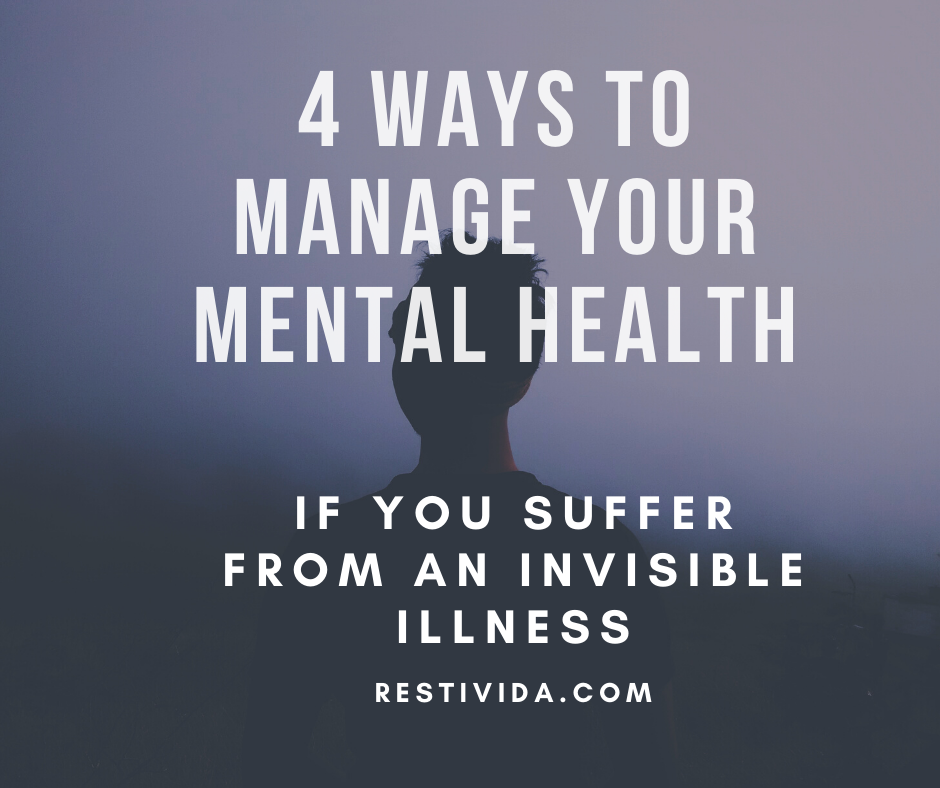4 ways to handle the psychological impact of invisible illness
Remember when you were a kid held up in bed with the cold, flu, chicken pox, mumps or measles? You had all the jello that you could ever eat, watched all the cartoons that you could and snuggled on the couch and in your bed undisturbed; great, right? The first few days maybe, but by the third day you started missing your friends and going outside and playing with your toys and riding your bike.
Your parents/guardians told you that no one is allowed to come over because you aren’t well and they may become ill as well. On top of all that you’re feeling horrible. Wow! Bummer! Not only are you feeling ill because of your ailment but now you’re feeling upset that you’re secluded and can’t see your friends and move around as freely as you’d like. Then the day comes! You’re better! You’re finally free to go back to school and have your friends over and you’re elated!
A number of things were working for and against you at once.
Against: You’re ill: This restricts you from going about doing the things you used to normally do. This causes you to feel frustrated.
For: You’re resting, getting that nutritious chicken soup and your body is repairing.
Against: You are secluded and away from all your friends. You are bored out of your mind for almost an entire week or two before you are free again.
For: You are keeping them safe from possibly getting sick and spreading the sickness further. In a couple week’s time you’re up and running again!
Now imagine if you will that you are never actually better! You always have that achy sick slimy feeling day in day out. No matter how long you sleep you’re never refreshed. All the things that you used to do are now on the “never do this again” list.
You start missing moments that you should be sharing: that wedding, birthday party, family picnic, a graduation event, game night and at the very worst even your job. You have had to let it all go. Day after day, you increasingly become sad, guilty, angry and frustrated!
Can the clock turn back to where you were feeling good again? Before you life was stolen?
Because that is what happened, your life was stolen!
Compared to the quality of life you had before the current state of affairs seems so grim. Before you get overwhelmed by sadness and become consumed by your feelings take a look at these four steps to overcoming the psychological impact of invisible illness on your mental health.
Invisible illnesses are those such as Lupus, Chronic Fatigue (CF), Fibromyalgia (FM), Rheumatoid Arthritis (RA), Plantar Fasciitis (PF), Sciatica among many others. Please leave me a comment if I did not mention your condition. I want everyone to feel included; please tell us your story; we would love to hear from you.
Aside from physical ailments they can leave you with serious psychological impacts if you’re not careful.

Here are four (4) ways to handle the psychological impacts of having an invisible illness.
1. Take these seven steps after you have been diagnosed.
After you have swallowed that bitter pill take some time to yourself. You might feel a sense of relief that there are finally answers. As crazy as this may sound, take a few moments to be grateful for your diagnosis.
Why?
You no longer have to worry what is wrong with you.
Now you know.
That part of the journey is behind you. You can now give someone advice on how to get diagnosed with an invisible illness and you can move forward to explore treatments and get your mental health under control.
2. Accept the things that you are no longer able to do
Also accept that you can’t do it at the intensity of what you were able to do them.
Can’t garden for 6 hours a day anymore? Keep a few of your favorites in easily accessible pots.
Can’t do high impact exercise or run a marathon anymore? Taichi, Yoga and walking as much as you can handle are great alternatives.
Can’t cook that 5 star meal for your family like you did before? Go to the kitchen with someone and teach them your recipe!
You will be spending quality time and getting some great work done. Do this with all your tasks.
Living alone? You’ll have to reach out to your community center or agencies and tell them you need help, financial or otherwise. It may take a while to figure this all out but opening the door will get the ball rolling to some positive changes.
3. Take control of your thoughts
Dialectical Behavioural Therapy Skills Workbook written by Matthew McKay, Ph.D. • Jeffery C. Wood, PSY.D. and Jeffery Brantley, MD is a FREE workbook that will address many overwhelming emotions in four (4) ways
i. Distress tolerance will help you manage features of your invisible illness such as flare-ups and acceptance of your new limitations.
ii. Mindfulness You will be able to be aware of the moment and fully aware of your present. You’ll also reduce the practice of negative thinking about yourself, others and your condition.
iii. Emotion regulation You will be able to be aware of how you feel in the moment you’re feeling it and decide that your reaction in that moment will not be impulsive or harmful to yourself or others.
iv. Interpersonal effectiveness Will teach you how to have healthy boundaries! This is important for maintaining a healthy relationship with your friends and family all the while looking after yourself.
4. Talk to your family and friends about your limitations
Stick to your boundaries. If you overexert yourself you’re the one left rolling in bed with a flare-up and life will continue around you, without you. As hard as it may seem you will have to say “no” quite a bit–even to your kids…the young ones too!
Create an environment around you and after a time you will release this energy that others that don’t even know you will begin to perceive.
Remember: You first! Your psychological and mental health IS first!
You cannot live the same life you did before you were diagnosed. That life is long gone. BUT you can live YOUR best life. You can’t control the pain and the numerous symptoms that affect you most of the time BUT you can control your thoughts, your reaction, how you feel about it and the persons you allow in your life. You can set clear healthy boundaries for those that must be a part of your day to day.
Live well!
